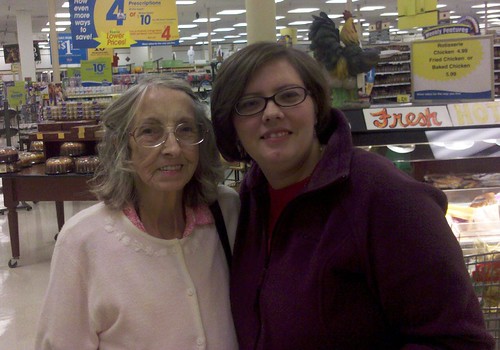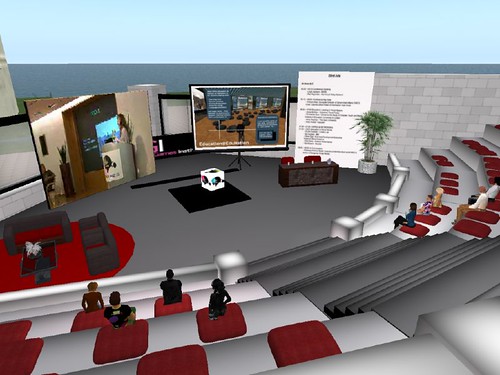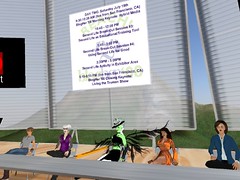On Friday, March 26th, I participated in the Governance in Virtual Worlds 2010 conference sponsored by the Sandra Day O’Connor College of Law and World2Worlds. The conference description:
Virtual worlds and online games are used by millions of people around the world for recreation, corporate and academic conferencing, formal education, research, training and charitable work. These worlds have given rise to public-policy issues, both ancient and cutting edge. Governance in Virtual Worlds will provide an exploration of these issues by professors, journalists, corporate managers and community activists. Learn what it means to be an active citizen, a creative producer, and a savvy customer, and meet the people shaping policy for the worlds of the future.
Now, I’ve attended a LOT of conferences, conversations, symposia, discussions, and other such things revolving around virtual worlds, but I must commend John Carter McKnight, Adjunct Professor of Law at Arizona State University for putting together a truly excellent group of panels. (And I’m not just saying that because I was on two of them!)  Though the conference was plagued with technical issues at the beginning, which happens sometimes, the panels sparked good conversations (and sometimes heated debate) and it was the first time in a while I heard some new ideas that made me stop in my tracks and think, “Oh, yeah. Why aren’t we talking about that?”
John Lester (formerly Pathfinder Linden) Gives Keynote Opening Address

For long time SL peeps, one of the highlights of the conference was John Lester‘s keynote opening address. Formerly known as Pathfinder Linden, who did much to promote the education and health care communities in world, John appeared as his original avatar from the SL beta (the first one!) days, Count Zeeman. John’s keynote was unfortunately one of the ones marred by the technical challenges, but he talked about the biological responses that humans have to our virtual experiences. He gave an example of a teacher who brings her students in world and right off the bat has them jump off a mountain. The students feel fear, vertigo, and all these physical reactions, they don’t know if they’re (their avatar) is going to die, they don’t know what to expect. The physical reactions we experience in virtual spaces are due to our brains having evolved to think in, navigate in, and respond to 3D data, we have entirely natural responses to 3D cues, it activates our lymbic system just as if we were standing on a physical mountain. Ok maybe to a lesser degree, still. 🙂
Of course, we’re missing key components of physicality in virtual worlds, particularly the non-verbal cues of body language, posture, etc. John reminded us Snow Crash fans that in Stephenson’s novel, the thing that made the metaverse take off was when it incorporated the natural body language of those who were jacked in, so we’re not yet at a point where I yawn in real life and my avatar yawns as well, but that’s where we’re headed.
I’m not sure if this was just my take or John’s, but there was some conversation that augmented reality is likely to top into the mainstream before virtual worlds, since handheld devices are already ubiquitous and the super-smart-phone genre like Droids and iPhones are becoming more commonplace and affordable. John mentioned the augmented reality windshield GM prototyped that I tweeted about the other day (woe the day our windshields get hacked!) and we talked about a future where our HUDs were not just on the screen but in our contact lenses. Good stuff!
In terms of governance of virtual spaces, the issue is that our current system of laws and courts are processes that move so exquisitely slowly, and yet the pace of technological change is accelerating at an ever faster pace. How are we to govern spaces that our current systems are not even remotely equipped to understand, let alone arbitrate? And that, of course, was the key question of the conference. It was great to see John and despite the audio glitches, it was great to see him in world again.
Keynote Panel:Â The Politics of Virtual Engagement
Next up was the keynote panel, which also had a rocky start on the technical end (again, not the fault of the conference organizers!) and I didn’t get to show my slides so I’ll embed them here:
I’d hoped to talk about how we can look at the small scale governance issues already cropping up at the institutional level, like in higher education, and then extrapolate how those issues will affect the larger ecosystem of institutions participating in virtual world spaces, but the tech issues got our timing and things off to a rocky start, so I’m not sure how much came through.  In any case, the “Politics of Virtual Engagement” at my university are just one example of many, but I think there are lessons to be learned. For example, virtual world evangelists and people like me trying to introduce the concept of virtual worlds to academia have to have a deep knowledge of our institutional culture. The needs of our student population are different than the needs of faculty, which are again different from the needs of administrators and staff.  The trick is trying to weave those needs together into virtual spaces and experiences that tap into what can only be done in virtual worlds or that virtual worlds do better than other platforms. People have to see how this technology meets their needs before it can scale up. This is as much true for every other domain – business, non-profits, online communities – as it is for higher education.
And the questions and issues raised by the students, faculty, and staff at the University of Cincinnati are likely to be echoed across the spectrum of institutions who move into virtual worlds.   This technology forces us to renegotiate long standing and entrenched boundaries that DO exist in the physical world, but are highly permeable in the virtual world.  What can we learn from early adopters who are already negotiating these shifting boundaries to make it easier for the early majority?
I also think virtual worlds expose the limits of our creativity and imagination in ways that are.. somehow less obvious in the physical world. Give a teacher the freedom to work in any kind of learning environment they can imagine rather than a traditional classroom, and you’re bound to get some blank stares.  And who can blame them! They aren’t accustomed to having that kind of freedom and flexibility, and conceptualizing the actual SPACE in which learning takes place is not in their knowledge domain because in the physical world, someone else designs the classrooms. And it isn’t just teachers, students, staff – it’s also me! The plasticity of virtual worlds gives us tremendous freedom to create settings and experiences that can’t be replicated in the real world, but our imaginations are not yet caught up to the possibilities this technology makes possible.
I feel that way even after participating in virtual environments for over 15 years at this point. Every day something new shakes my world and hints at possibilities I hadn’t even considered. It’s fascinating stuff.  And I think in the long term, all the other issues – who owns your data, privacy issues, conflicts over copyright and IP – these issues don’t have simple black and white answers, the inter-relationships forming between individuals and individuals, and individuals with institutions, and institutions with institutions, and scaling all the way up to encompass the global digital community and ecosystem, these things are so complex, and emerging and evolving so quickly, I just can’t imagine that our existing institutions will survive in anything resembling their current forms.  I guess we’ll see!
Real Laws in Virtual Space
There were two speakers in the next panel who made a lasting impression on my overwhelmed brain. Joshua Fairfield, Associate Prof of Law at Washington and Lee School of Law, and Gregory Lastowka, Professor at Rutgers School of Law.  This post is already getting long, so I’ll sum up quickly. Joshua’s main point was that we are spending an awful lot of brain cycles worrying about how RL law is going to impact v irtual worlds, and not enough time thinking about how the rules of virtual worlds would be horrific if implemented in RL. Good point! From my quickly jotted notes as he was speaking:
irtual worlds, and not enough time thinking about how the rules of virtual worlds would be horrific if implemented in RL. Good point! From my quickly jotted notes as he was speaking:
Imagine IP licenses embedded in our toaster, our clothing, our cars, as we do have constraints on our use of virtual property. What then?  On privacy, we all know from the Bragg case sued Linden Lab, LL has ALL communications from people in world, all IMs, they were able to pull up IMs from years before.. All of those convos can be sometimes must be made available without a search warrant, no probably cause required. The essential irony – we go to escape and are under constant surveillance. Cell phoen tracks you through GPS whereever you go. So the question is, are we losing our personhood? Personhood, once property and privacy are in trouble, personhood will follow. We are a social network in our selves, the social networks we use are coming to OWN that tangle of connections that we are. We will hand over our personhood when all aspects of our behavior, posessions, creations, and communications are owned by .. someone else.
Gregory Lastowska’s talk was also good, again my raw notes:
Virtual Worlds as a separate jurisdiction.. virtual law as separate rules of physical jurisdiction. Play spaces are governed by a separate set of rules, we can look at different human societies, say the rules pertaining to education, religion, or family, they are sort of “special spheres” of human interaction, so there may be some precedent for game worlds, but that isn’t the trend we’re seeing, the courts are treating them just like web sites, so not seen as separate sites of jurisdiction which may not always be the right way. David Post, Jefferson’s Moose, hypothesize different laws for cyberspace. If we were to look at the internet and copyright law, we never would have developed our copyright law as we did because much of it doesn’t WORK as applied to the internet, the net is constant copying, every microsecond there are violations, and when it comes to financial importance, lawsuits, Napster etc. you see the general trend is to limit the growth of the technology in order to serve the copyright law, and that seems ,.. not good.
SO – if this were a separate space, what kind of law would we have?
Second the point on augmented reality, separate from VW issues? We will see some issues from VW will also be issues with augmented reality, primarily the difference between the customer/client and the owner/server operators, as we move towards cloud computing, balance between tech and law, Lessig’s Code..
Got interrupted, work phone call. Then a meeting and I missed some of the next panels. Bummer. 🙁
Virtual Self Governance
The last panel was about how communities existing in virtual worlds govern themselves, and I was really excited to talk about my own virtual community, Chilbo, in this setting.  Here are my slides from that presentation:
Now strangely, it seemed that one of the other panelists was upset that I had slides, that I talked specifically about how the Chilbo Community formed and was governed, and especially that my last slide invited people to visit and explore our town. Frankly, I thought that’s what everyone on the panel was going to do, per the instructions I received from the conference organizers, so I’m not sure exactly where the miscommunication occurred.  If I wasn’t supposed to talk specifically about Chilbo, then I’m not sure what the point of the panel was! Further, the other panelist also seemed to disbelieve my statements about our experience. I didn’t expect any of the content I presented to be .. inflammatory or controversial, rather I thought the point of the discussion was to talk about some of the specifics of how different in world communities form, govern themselves, and use the tools and platforms to self-organize.
Perhaps I misread the tone of the other panelist, but I felt distinctly defensive after a bit. As hard as it may be to believe, yes, we do actually mostly govern by consensus and no, acrimony, arguments, and strife are not very common – in fact, it’s quite rare. That isn’t to say there are never any disagreements, just that differences of opinion or conflicting interests seem to be resolved with little fanfare and few fireworks. I confess, I know very little about the inner-workings of CDS. I’ve very pointedly made an effort to let the structure and processes of governing Chilbo evolve out of our specific culture, community, and needs, rather than trying to emulate or model it after something else – because in some sense, though human communities are obviously not new, the thing that IS new is the who’s, why’s, and how’s of how we have all come to be together in this particular virtual world, in this particular region, at this particular time.  Though as Rose Springvale said, we don’t want to reinvent the wheel (a good point!), I think we also have to give ourselves the freedom to imagine new ways of self-governing to break out of systems of governance that were developed in a pre-digital age.
In any case, I’m not suggesting that the Chilbo model is perfect for everyone and maybe wouldn’t work for any community but our own, and it isn’t even as if I understand exactly how or why it seems to be as successful as it is at constraining the discord that often appears in online communities, but for whatever reason, it seems to be working for us on a lot of levels, and so my goal was to share about our experience. That really shouldn’t have offended anyone’s sensibilities, I don’t think.
Overall, I felt it was a great conference and I was sorry to have missed a couple of the panels, but I hope everyone else enjoyed it as much as I did and many thanks to all the folks who organized, attended, and participated.




 irtual worlds, and not enough time thinking about how the rules of virtual worlds would be horrific if implemented in RL. Good point! From my quickly jotted notes as he was speaking:
irtual worlds, and not enough time thinking about how the rules of virtual worlds would be horrific if implemented in RL. Good point! From my quickly jotted notes as he was speaking:





